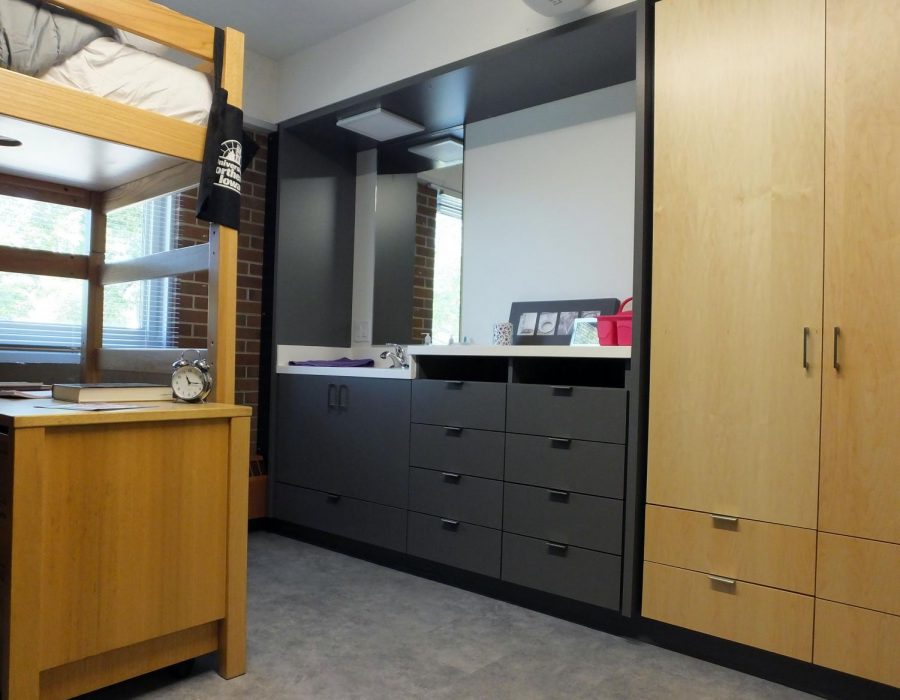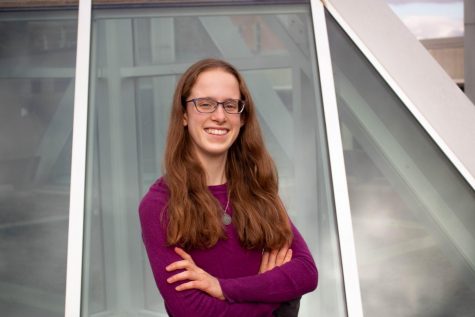DOR makes changes, looks ahead
Noehren Hall is one of the many places on campus experiencing changes for the 2019-2020 academic year.
Sep 5, 2019
UNI students returning to campus this fall were greeted by updates in university housing and dining offerings.
Dancer Hall is closed for the 2019-2020 academic year, largely based on contracting rates, according to Glenn Gray, Executive Director of Residence.
“Bender and Dancer…are typically the last two halls to fill on campus, and they also have the lowest re-contracting rate,” Gray said. “Students are telling us with their contract behaviors that they prefer not to live there.”
Dancer was closed rather than Bender due to a “slightly higher” preference for Bender shown through student contracting rates, Gray said.
The first floor of Campbell Hall is also closed for the academic year. This closure demonstrates the additional reasoning behind the north campus closures: the high level of deferred maintenance in Bender, Dancer and Campbell.
“Campbell has about 50% of deferred maintenance,” Gray said. To complete the required updates would cost about 50% of the building’s worth.
In fall 2019, the first floor of Campbell experienced flooding, but Gray clarified that this specific incident was not the sole reason for closing the first floor.
“We have had water problems in that area,” he said, “and knowing that we have an excess of housing, rather than risk students having belongings damaged due to water, we decided to take them offline until we decide what to do with Campbell.”
Although no renovations are currently underway in either Campbell or Dancer, Gray emphasized that changes will likely be coming soon.
“We have to determine what we can do with Dancer Hall with its structure… which walls can be removed without compromising the structural integrity,” he said. “I would like to get an engineer inside of Dancer while it is closed to do a deep analysis to see what we can and can’t do.”
As part of that process, DOR has hired three consultants who are currently conducting housing, dining, and market analyses. The consultants will present a report of their findings to the senior DOR leadership team and university executives by the end of the semester, Gray hopes. DOR will then spend spring 2020 gathering student feedback on the options presented by the consultants and hopefully make a final decision by the end of the academic year so that work can begin during summer 2020.
As north campus experiences closures, the first section of the newly renovated Noehren Hall opened this fall, with modern rooms and common spaces as well as pod-style bathrooms. The latter is an effort to meet the expectations of new generations of students, many of whom are accustomed to private bathrooms, Gray said.
One thing the “new Noehren” doesn’t have, however, is cable TV in student rooms. Gray explained that the university is moving toward discontinuing cable TV in the dorms campus-wide, and the updated rooms in Noehren mark the beginning of that trend.
“The majority of students… don’t watch cable TV anymore,” he said. “They’re streaming most of their viewing, so we’re approaching the day we’re going to discontinue spending $100,000 of student money [per year] on cable TV and instead re-invest in faster and greater bandwidth for streaming purposes to meet the expectations of students in the future.”
This year, the second section of Noehren is closed for construction, and will open in fall 2020, when work will begin on the third and final section, to be completed by fall of 2021. Gray said the goal is to proceed to Hagemann Hall once work in Noehren is complete.
The dining side of DOR has also changed with north campus once again noticing the greatest shift. Rialto in Towers Dining Center no longer offers late breakfast, lunch or dinner, and is also closed on Sundays. Piazza in Redeker Dining Center is closed on Saturdays.
Gray stated that the decision, was due to a desire to keep student rates low, while also keeping in mind the decrease in students living on north campus.
Sophomore pre-nursing major Diego Samaniego, a resident of Lawther Hall, said the changes in hours are “definitely frustrating,” especially the lack of late dinner at Rialto.
“I do rugby, so right after practice at 7:00 [p.m.], I have to walk all the way to Piazza, when I could have just gone [to Rialto] and then had more time to do homework and stuff like that,” Samaniego said.
Kayla Cripps, a freshman pre-nursing major who lives in Bender Hall, agreed, stating that late dinner would have been a convenient option when she begins working off-campus.
However, she noted that the changes didn’t affect her decision to contract in Bender.
“I knew that I could get food if I needed food; I wouldn’t starve or anything,” Cripps said.
Gray emphasized that the changes are not necessarily permanent.
“There’s a method to the madness. We’re not just taking some dorms offline and limiting dining plans to try and frustrate students. We’re doing it to see where we need to go next with our housing and dining program,” he said. “So what you see today—Dancer offline, Rialto more limited hours—may be very different than what students are on the receiving end of next year. And we’re very excited about that because we’re hoping that whatever it is, it’s going to get students excited about living on campus.”









